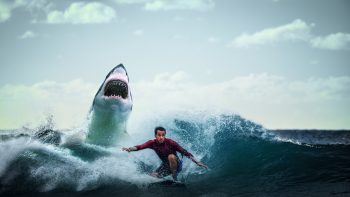Should you be afraid of sharks in the Baltic Sea in Poland? Posted by Kasia on Jul 28, 2019 in Nature
My kids have been obsessed with shark shows lately! Every day that’s all they want to watch! And since it’s a shark week, there are plenty of shows to choose from:)
From ancient times sailors (żeglarze) have created legends (legendy) about a large marine predator. The fin sticking up above the surface of the water was a sign of upcoming death.
Over the years, sharks have gotten a bad reputation as bloodthirsty man-eaters! But in fact, there’s far more to sharks than their bite. It turns out that sharks have more reason to fear humans than the other way around. Every year, the finds of between 26 and 73 million sharks are traded in markets around the world. The threats we pose are many. There are the accidental killing of sharks in fishing gear intended for other species. Then there is illegal poaching and hunting: selling shark fins for soup and sport fishing for shark-jaw trophies!
However, people of course are afraid of shark attacks. While shark encounters do occur, they are actually extremely rare—despite the extensive media coverage they usually receive.
So, do they happen in the Baltic Sea (Morze Bałtyckie)? Should you be worry swimming in the Baltic Sea while on the beach in Sopot or Gdańsk?
When you hear about sharks (rekiny), most people automatically think about the tropics and crystal clear blue waters… But the truth is that there are sharks all around the world, even in the cold waters of the Baltic Sea…In fact, 31 species of sharks, rays and chimaeras (class of Cartilaginous fish-Chondrichthyes), have been recorded in the Baltic Sea & Kattegat, but we rarely hear about them because there are so few left.
Although Baltic Sea is a cold region (while sharks prefer a warmer climate), you can still find some sharks there.
Some of the most common include the following: spiny dogfish (Squalus acanthias), thorny skate (Amblyraja radiata)….and and small-spotted catshark (Scyliorhinus canicula) are the most popular. You really shouldn’t be afraid of a great white shark or any other big shark that may be dangerous to people. In fact, there hasn’t been any shark attacks recorded at any of the beaches in Poland! There you go!

Build vocabulary, practice pronunciation, and more with Transparent Language Online. Available anytime, anywhere, on any device.





Comments:
Pisy:
I’m still not going because I don’t want to be the 1st one